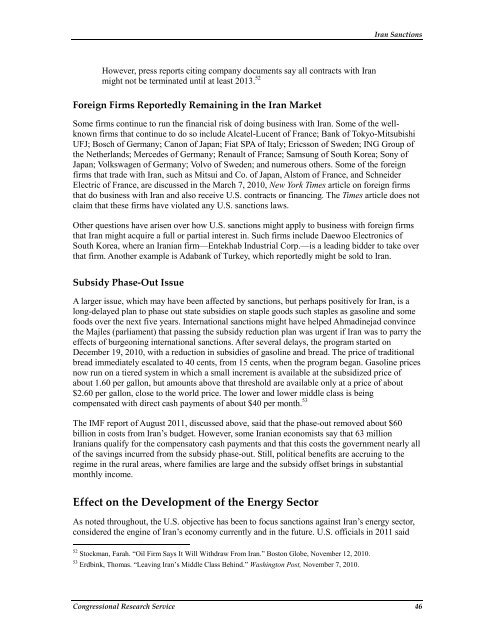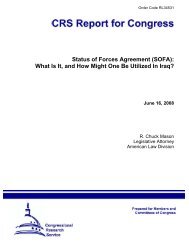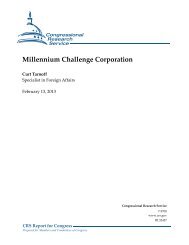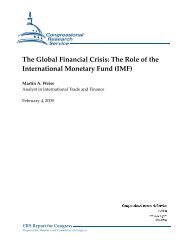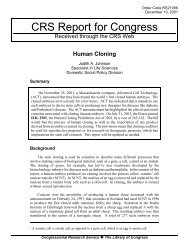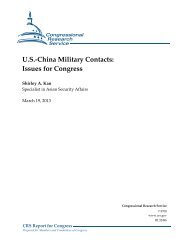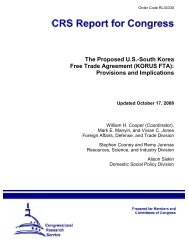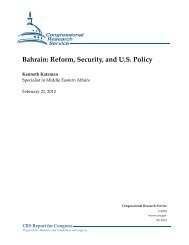Iran Sanctions - Foreign Press Centers
Iran Sanctions - Foreign Press Centers
Iran Sanctions - Foreign Press Centers
You also want an ePaper? Increase the reach of your titles
YUMPU automatically turns print PDFs into web optimized ePapers that Google loves.
However, press reports citing company documents say all contracts with <strong>Iran</strong><br />
might not be terminated until at least 2013. 52<br />
<strong>Foreign</strong> Firms Reportedly Remaining in the <strong>Iran</strong> Market<br />
<strong>Iran</strong> <strong>Sanctions</strong><br />
Some firms continue to run the financial risk of doing business with <strong>Iran</strong>. Some of the wellknown<br />
firms that continue to do so include Alcatel-Lucent of France; Bank of Tokyo-Mitsubishi<br />
UFJ; Bosch of Germany; Canon of Japan; Fiat SPA of Italy; Ericsson of Sweden; ING Group of<br />
the Netherlands; Mercedes of Germany; Renault of France; Samsung of South Korea; Sony of<br />
Japan; Volkswagen of Germany; Volvo of Sweden; and numerous others. Some of the foreign<br />
firms that trade with <strong>Iran</strong>, such as Mitsui and Co. of Japan, Alstom of France, and Schneider<br />
Electric of France, are discussed in the March 7, 2010, New York Times article on foreign firms<br />
that do business with <strong>Iran</strong> and also receive U.S. contracts or financing. The Times article does not<br />
claim that these firms have violated any U.S. sanctions laws.<br />
Other questions have arisen over how U.S. sanctions might apply to business with foreign firms<br />
that <strong>Iran</strong> might acquire a full or partial interest in. Such firms include Daewoo Electronics of<br />
South Korea, where an <strong>Iran</strong>ian firm—Entekhab Industrial Corp.—is a leading bidder to take over<br />
that firm. Another example is Adabank of Turkey, which reportedly might be sold to <strong>Iran</strong>.<br />
Subsidy Phase-Out Issue<br />
A larger issue, which may have been affected by sanctions, but perhaps positively for <strong>Iran</strong>, is a<br />
long-delayed plan to phase out state subsidies on staple goods such staples as gasoline and some<br />
foods over the next five years. International sanctions might have helped Ahmadinejad convince<br />
the Majles (parliament) that passing the subsidy reduction plan was urgent if <strong>Iran</strong> was to parry the<br />
effects of burgeoning international sanctions. After several delays, the program started on<br />
December 19, 2010, with a reduction in subsidies of gasoline and bread. The price of traditional<br />
bread immediately escalated to 40 cents, from 15 cents, when the program began. Gasoline prices<br />
now run on a tiered system in which a small increment is available at the subsidized price of<br />
about 1.60 per gallon, but amounts above that threshold are available only at a price of about<br />
$2.60 per gallon, close to the world price. The lower and lower middle class is being<br />
compensated with direct cash payments of about $40 per month. 53<br />
The IMF report of August 2011, discussed above, said that the phase-out removed about $60<br />
billion in costs from <strong>Iran</strong>’s budget. However, some <strong>Iran</strong>ian economists say that 63 million<br />
<strong>Iran</strong>ians qualify for the compensatory cash payments and that this costs the government nearly all<br />
of the savings incurred from the subsidy phase-out. Still, political benefits are accruing to the<br />
regime in the rural areas, where families are large and the subsidy offset brings in substantial<br />
monthly income.<br />
Effect on the Development of the Energy Sector<br />
As noted throughout, the U.S. objective has been to focus sanctions against <strong>Iran</strong>’s energy sector,<br />
considered the engine of <strong>Iran</strong>’s economy currently and in the future. U.S. officials in 2011 said<br />
52<br />
Stockman, Farah. “Oil Firm Says It Will Withdraw From <strong>Iran</strong>.” Boston Globe, November 12, 2010.<br />
53<br />
Erdbink, Thomas. “Leaving <strong>Iran</strong>’s Middle Class Behind.” Washington Post, November 7, 2010.<br />
Congressional Research Service 46


